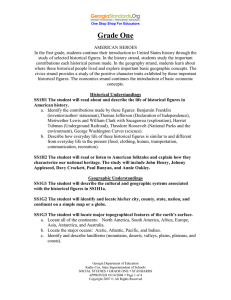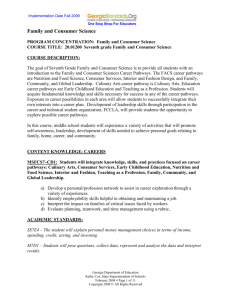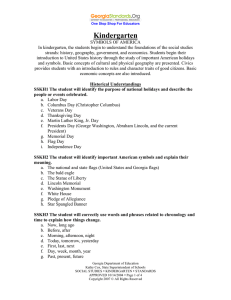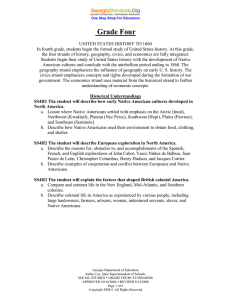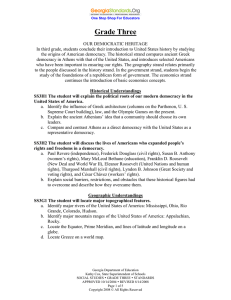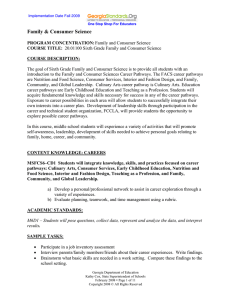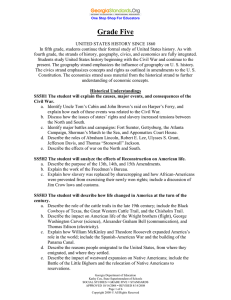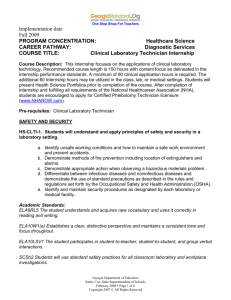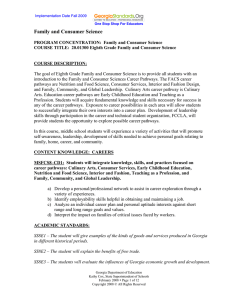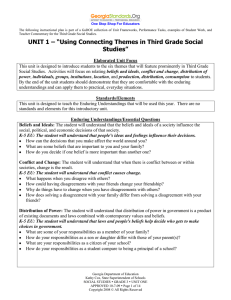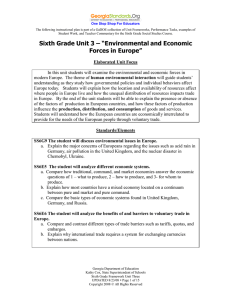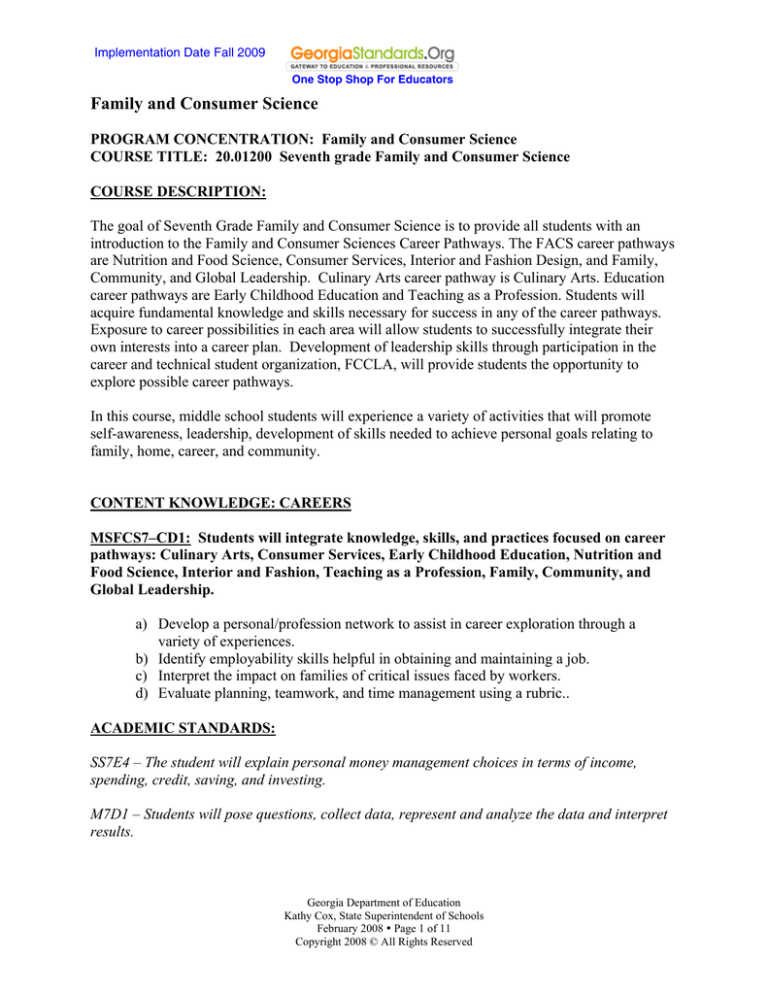
Implementation Date Fall 2009
One Stop Shop For Educators
Family and Consumer Science
PROGRAM CONCENTRATION: Family and Consumer Science
COURSE TITLE: 20.01200 Seventh grade Family and Consumer Science
COURSE DESCRIPTION:
The goal of Seventh Grade Family and Consumer Science is to provide all students with an
introduction to the Family and Consumer Sciences Career Pathways. The FACS career pathways
are Nutrition and Food Science, Consumer Services, Interior and Fashion Design, and Family,
Community, and Global Leadership. Culinary Arts career pathway is Culinary Arts. Education
career pathways are Early Childhood Education and Teaching as a Profession. Students will
acquire fundamental knowledge and skills necessary for success in any of the career pathways.
Exposure to career possibilities in each area will allow students to successfully integrate their
own interests into a career plan. Development of leadership skills through participation in the
career and technical student organization, FCCLA, will provide students the opportunity to
explore possible career pathways.
In this course, middle school students will experience a variety of activities that will promote
self-awareness, leadership, development of skills needed to achieve personal goals relating to
family, home, career, and community.
CONTENT KNOWLEDGE: CAREERS
MSFCS7–CD1: Students will integrate knowledge, skills, and practices focused on career
pathways: Culinary Arts, Consumer Services, Early Childhood Education, Nutrition and
Food Science, Interior and Fashion, Teaching as a Profession, Family, Community, and
Global Leadership.
a) Develop a personal/profession network to assist in career exploration through a
variety of experiences.
b) Identify employability skills helpful in obtaining and maintaining a job.
c) Interpret the impact on families of critical issues faced by workers.
d) Evaluate planning, teamwork, and time management using a rubric..
ACADEMIC STANDARDS:
SS7E4 – The student will explain personal money management choices in terms of income,
spending, credit, saving, and investing.
M7D1 – Students will pose questions, collect data, represent and analyze the data and interpret
results.
Georgia Department of Education
Kathy Cox, State Superintendent of Schools
February 2008 y Page 1 of 11
Copyright 2008 © All Rights Reserved
Implementation Date Fall 2009
One Stop Shop For Educators
SAMPLE TASKS:
•
•
•
Take an inventory test to assess career aptitude.
Research various careers of interest.
Create a career portfolio.
CONTENT KNOWLEDGE: EARLY CHILDHOOD EDUCATION
MSFCS7–ECE1: Students will analyze human growth and development and demonstrate
the integration of knowledge, skills and practices of the caregiver-educator roles.
a)
b)
c)
d)
e)
f)
Identify stages of human development.
Describe the influence of heredity and environment on human development.
List careers related to working with children.
Create developmentally appropriate games and activities for young children.
Identify safety rules when working with children.
List techniques for positive relationships with children.
ACADEMIC STANDARDS:
S7CS2 – Students will use standard safety practices for all classroom laboratory and field
investigations.
SAMPLE TASKS:
•
•
•
•
•
•
Create a visual/project showing stages of human development
Research, compare/contrast heredity and environment
Plan a fieldtrip to a local elementary or preschool and read to young children.
Work with a partner and write a book dealing with childhood safety issues.
Collect songs, finger plays, recipes, and activities for different ages and stages (use index
card/index books to store collection).
Share guest speaker with students working in the ECE field.
CONTENT KNOWLEDGE: FOOD, NUTRITION AND WELLNESS
MSFCS7–FNW1: Students will apply principles of food science, food technology, and
nutrition and their relationships to growth, development, health, and wellness to support
informed decision-making that promotes good health.
a) Investigate the dietary guidelines and www.mypyramid.gov.
b) Apply essential concepts related to nutrients and dietary requirements to personal
nutritional habits.
c) Evaluate factors that affect food quality and nutrient retention.
Georgia Department of Education
Kathy Cox, State Superintendent of Schools
February 2008 y Page 2 of 11
Copyright 2008 © All Rights Reserved
Implementation Date Fall 2009
One Stop Shop For Educators
d) Demonstrate safety and sanitation practices.
e) Identify and demonstrate acceptable behaviors for table service and etiquette.
f) Distinguish between the correct use of liquid and dry measuring utensils.
ACADEMIC STANDARDS:
S7CS4 – Students will use tools and instruments for observing, measuring, and manipulating
equipment and materials in scientific activities.
M7P4 – Students will make connections among mathematical ideas and to other disciplines.
SAMPLE TASKS:
•
•
•
•
•
•
Utilize website www.mypyramid.gov.
Create a class project on nutrients such as a booklet, brochure, power point presentation
or newsletter.
Follow a recipe and prepare simple food items.
Demonstrate placement and usage of tableware.
Demonstrate the correct measuring of dry and liquid ingredients.
Investigate the most common causes of food-borne illnesses.
CONTENT KNOWLEDGE: FOODS (CULINARY ARTS)
MSFCS7–FCA1: Students will demonstrate food preparation and service knowledge and
skills.
a) Students will identify and demonstrate use of kitchen equipment and utensils.
b) Students will demonstrate kitchen safety procedures and sanitation activities.
c) Students will apply the dietary guidelines and www.mypyramid.gov.
ACADEMIC STANDARDS:
S7CS4 – Students will use tools and instruments for observing, measuring, and manipulating
equipment and materials in scientific activities.
M7P4 – Students will make connections among mathematical ideas and to other disciplines.
SAMPLE TASKS:
•
•
•
•
•
Create a cooking show
Design/prepare a nutritionally sound meal.
Demonstrate food service knowledge through role play.
Invite guest speakers/presenters
Visit local culinary programs in technical colleges.
Georgia Department of Education
Kathy Cox, State Superintendent of Schools
February 2008 y Page 3 of 11
Copyright 2008 © All Rights Reserved
Implementation Date Fall 2009
One Stop Shop For Educators
CONTENT KNOWLEDGE: CONSUMER AND FINANCE
MSFCS7–CF1: Students will identify and discuss social and financial skills needed to
develop independence and interpersonal relationships.
a) Determine the importance of money and time management.
b) State factors needed to develop short term and long term financial goals.
c) Assess resources available to meet the needs of individuals and families.
ACADEMIC STANDARDS:
SS7E4 – The student will explain personal money management choices in terms of income,
spending, credit, saving, and investing.
M7P4 – Students will make connections among mathematical ideas and to other disciplines.
SAMPLE TASKS:
•
•
•
•
•
Create a daily/weekly schedule.
Create a personal budget.
Compare/contrast credit versus debit.
Identify most commonly used terminology related to banking and finance.
Play a budget game.
MSFCS7–CF2: Students will analyze factors (social, psychological, economic, cultural)
affecting consumer and management decisions for individuals and families and how those
decisions impact society.
a)
b)
c)
d)
e)
f)
Identify the types of available credit.
Compare sources of credit and cash.
Evaluate the cost and limitations of credit.
Identify consumer rights and responsibilities.
Assess how advertising impacts consumer decisions.
Judge the impact of technology on consumers.
ACADEMIC STANDARDS:
SS7E4 – The student will explain personal money management choices in terms of income,
spending, credit, saving, and investing.
M7P3 – Students will communicate mathematically.
Georgia Department of Education
Kathy Cox, State Superintendent of Schools
February 2008 y Page 4 of 11
Copyright 2008 © All Rights Reserved
Implementation Date Fall 2009
One Stop Shop For Educators
SAMPLE TASKS:
•
•
•
•
•
•
•
•
Compare/contrast credit versus debit.
Identify most commonly used terminology related to banking and finance.
Investigate the impact of technology on banking and finance options.
Explore the pros and cons of online shopping.
Design a brochure, booklet or flyer describing consumer’s rights and responsibilities.
Create a commercial.
Create a survey.
Use the FCCLA national program Financial Fitness to evaluate financial knowledge (can
go to website and take on-line questionnaire).
CONTENT KNOWLEDGE: INTERIOR DESIGN
MSFCS7–ID1: Students will analyze factors (social, psychological, economic, cultural)
affecting housing and interior design decisions for individuals and families and how those
decision impact society.
a)
b)
c)
d)
Identify household tasks needed for efficient care of living space.
Evaluate family tasks and adjustments related to moving.
Practice ways to organize and design living space.
Identify adaptations that would improve a living space for individuals with disabling
conditions.
ACADEMIC STANDARDS:
M7A3 – Students will understand relationships between two variables.
M7P4 – Students will make connections among mathematical ideas and to other disciplines.
SAMPLE TASKS:
•
•
•
•
•
•
Compare/contrast generic versus brand name cleaning supplies.
Create a “Clean Green” campaign.
Develop a cleaning schedule for personal space.
Design a presentation highlighting universal designs.
Invite speakers working in the interior design careers to speak to class.
Invite professionals working with individuals with disabilities and how living space can
be designed.
Georgia Department of Education
Kathy Cox, State Superintendent of Schools
February 2008 y Page 5 of 11
Copyright 2008 © All Rights Reserved
Implementation Date Fall 2009
One Stop Shop For Educators
CONTENT KNOWLEDGE: FASHION DESIGN
MSFCS7–FD1: Students will analyze factors (social, psychological, economic, cultural)
affecting textile and apparel decisions for individuals and families and how those decisions
impact society.
a) Identify lifestyle and preferences affecting clothing choices.
b) Use care label information to select appropriate procedure for care of clothing and
accessories.
c) Use creative ideas and materials to personalize an individual and/or group project.
ACADEMIC STANDARDS:
S7CS2 – Students will use standard safety practices for all classroom laboratory and field
investigations.
M7P4 – Students will make connections among mathematical ideas and to other disciplines.
SAMPLE TASKS:
•
•
•
•
Define lifestyle and its effect on wardrobe designing.
Evaluate personal wardrobe and the wardrobes of family members.
Complete a home assignment demonstrating textile care.
Create a project on re-designing or recycling clothing items.
CONTENT KNOWLEDGE: FAMILY, COMMUNITY, AND LEADERSHIP
MSFCS7–FCGL1: Students will demonstrate teamwork, leadership skills, and knowledge
to become leaders in the family, workplace, and community.
a) Identify the elements of an environment that encourages and respects the ideas,
perspectives, and contributions of all group members.
b) Discuss community and civic responsibilities, volunteerism, volunteer management
and recognition, and social services.
c) Analyze the characteristics of persons who are valued leaders and citizens in the
community.
d) Develop a project that demonstrates leadership skills.
ACADEMIC STANDARDS:
M7P1 – Students will solve problems (using appropriate technology).
M7P3 – Students will communicate mathematically.
M7P4 – Students will make connections among mathematical ideas and to other disciplines.
Georgia Department of Education
Kathy Cox, State Superintendent of Schools
February 2008 y Page 6 of 11
Copyright 2008 © All Rights Reserved
Implementation Date Fall 2009
One Stop Shop For Educators
M7P5 – Students will represent mathematics in multiple ways.
SAMPLE TASKS:
•
Use FCCLA programs: Dynamic Leadership
Power of One
Community Service
F.A.C.T.S. (Families Acting for Community Traffic Safety)
Financial Fitness
Student Body
Families First
Leaders at Work
STAR Events
Career Connections
Stop the Violence
READING STANDARD COMMENT:
After the elementary years, students are seriously engaged in reading for learning. This
process sweeps across all disciplinary domains, extending even to the area of personal learning.
Students encounter a variety of informational as well as fictional texts, and they experience text
in all genres and modes of discourse. In the study of various disciplines of learning (language
arts, mathematics, science, social studies), students must learn through reading the communities
of discourse of each of those disciplines. Each subject has its own specific vocabulary, and for
students to excel in all subjects, they must learn the specific vocabulary of those subject areas in
context.
Beginning with the middle grade years, students begin to self-select reading materials
based on personal interests established through classroom learning. Students become curious
about science, mathematics, history, and literature as they form contexts for those subjects
related to their personal and classroom experiences. As students explore academic areas through
reading, they develop favorite subjects and become confident in their verbal discourse about
those subjects.
Reading across curriculum content develops both academic and personal interests in
students. As students read, they develop both content and contextual vocabulary. They also build
good habits for reading, researching, and learning. The Reading Across the Curriculum standard
focuses on the academic and personal skills students acquire as they read in all areas of learning.
CTAEMRC-1: Students will enhance reading in all curriculum areas by:
a. Reading in all curriculum areas.
Georgia Department of Education
Kathy Cox, State Superintendent of Schools
February 2008 y Page 7 of 11
Copyright 2008 © All Rights Reserved
Implementation Date Fall 2009
One Stop Shop For Educators
•
Read a minimum of 25 grade-level appropriate books per year from a variety of
subject disciplines and participate in discussions related to curricular learning in
all areas.
• Read both informational and fictional texts in a variety of genres and modes of
discourse.
• Read technical texts related to various subject areas.
b. Discussing books.
• Discuss messages and themes from books in all subject areas.
• Respond to a variety of texts in multiple modes of discourse.
• Relate messages and themes from one subject area to messages and themes in
another area.
• Evaluate the merit of texts in every subject discipline.
• Examine author’s purpose in writing.
• Recognize the features of disciplinary texts.
c. Building vocabulary knowledge.
• Demonstrate an understanding of contextual vocabulary in various subjects.
• Use content vocabulary in writing and speaking.
• Explore understanding of new words found in subject area texts.
d. Establishing context.
• Explore life experiences related to subject area content.
• Discuss in both writing and speaking how certain words are subject area related.
• Determine strategies for finding content and contextual meaning for unknown
words.
WRITING:
The student writes clear, coherent text. The writing shows consideration of the audience and
purpose. The student progresses through the stages of the writing process (e.g., prewriting,
drafting, revising, and editing successive versions).
CTAEW-1: The student demonstrates competence in a variety of genres.
The student produces technical writing (business correspondence: memoranda, emails, letters of
inquiry, letters of complaint, instructions and procedures, lab reports, slide presentations) that:
a) Creates or follows an organizing structure appropriate to purpose, audience, and
context.
b) Excludes extraneous and inappropriate information.
c) Follows an organizational pattern appropriate to the type of composition.
d) Applies rules of Standard English.
Georgia Department of Education
Kathy Cox, State Superintendent of Schools
February 2008 y Page 8 of 11
Copyright 2008 © All Rights Reserved
Implementation Date Fall 2009
One Stop Shop For Educators
CTAEW-2: The student uses research and technology to support writing.
The student:
a) Identifies topics, asks and evaluates questions, and develops ideas leading to inquiry,
investigation, and research.
b) Uses organizational features of electronic text (e.g., bulletin boards, databases,
keyword searches, e-mail addresses) to locate relevant information.
c) Includes researched information in different types of products (e.g., compositions,
multimedia presentations, graphic organizers, projects, etc.).
d) Uses appropriate structures to ensure coherence (e.g., transition elements).
e) Supports statements and claims with anecdotes, descriptions, facts and statistics, and
specific examples.
f) Gives credit for both quoted and paraphrased information in a bibliography by using a
consistent and sanctioned format and methodology for citations.
CTAEW-3: The student consistently uses the writing process to develop, revise, and
evaluate writing.
The student:
a) Plans and drafts independently and resourcefully.
b) Uses strategies of note taking, outlining, and summarizing to impose structure on
composition drafts.
c) Edits writing to improve word choice after checking the precision of the vocabulary.
ENTREPRENEURSHIP:
MKT-EN-1: Understands concepts and processes associated with successful
entrepreneurial performance.
a)
b)
c)
d)
e)
f)
g)
h)
i)
Define entrepreneurship.
Identify and analyze characteristics of a successful entrepreneur.
Identify the reasons for planning in entrepreneurial businesses.
Discuss the entrepreneurial discovery processes.
Assess global trends and opportunities.
Determine opportunities for business creation.
Generate ideas for business.
Determine feasibility of ideas.
Determine the major reasons for business failure.
Georgia Department of Education
Kathy Cox, State Superintendent of Schools
February 2008 y Page 9 of 11
Copyright 2008 © All Rights Reserved
Implementation Date Fall 2009
One Stop Shop For Educators
ACADEMIC STANDARDS:
ELA8W1 – The student produces writing that establishes an appropriate organizational
structure, sets a context and engages the reader, maintains a coherent focus throughout, and
signals a satisfying closure.
ELA8W3 – The student uses research and technology to support writing.
SSEF6 – The student will explain how productivity, economic growth and future standards of
living are influenced by investment in factories, machinery, new technology and the health,
education and training of people.
SSEIN1 – The student will explain why individuals, businesses and governments trade goods and
services.
MKT-EN-2: Explain the fundamental concepts of business ownership.
a)
b)
c)
d)
e)
f)
g)
h)
i)
j)
Determine the relationship of competition to our private, free enterprise system.
Explain the effects of competition on buyers and sellers.
Identify the common types of business ownership.
Compare and contrast the advantages and disadvantages of each type of ownership.
Explain relevant government regulations relating to the operation of a business.
Discuss the types of risks that businesses encounter.
Explain how businesses deal with the various types of risks.
Identify the market segment for the business.
Formulate a marketing mix designed to reach a specific market segment.
Utilize the marketing functions to determine the competitive advantage of the
proposed business.
ACADEMIC STANDARDS:
ELA8W1 – The student produces writing that establishes an appropriate organizational
structure, sets a context and engages the reader, maintains a coherent focus throughout, and
signals a satisfying closure.
ELA8W3 – The student uses research and technology to support writing.
SSEF5 – The student will describe the roles of government in a market economy.
CTAE FOUNDATION SKILLS:
The Foundation Skills for Career, Technical and Agricultural Education (CTAE) are
critical competencies that students pursuing any career pathway should exhibit to be successful.
Georgia Department of Education
Kathy Cox, State Superintendent of Schools
February 2008 y Page 10 of 11
Copyright 2008 © All Rights Reserved
Implementation Date Fall 2009
One Stop Shop For Educators
As core standards for all career pathways in all program concentrations, these skills link career,
technical and agricultural education to the state’s academic performance standards.
The CTAE Foundation Skills are aligned to the foundation of the U.S. Department of
Education’s 16 Career Clusters. Endorsed by the National Career Technical Education
Foundation (NCTEF) and the National Association of State Directors of Career Technical
Education Consortium (NASDCTEc), the foundation skills were developed from an analysis of
all pathways in the sixteen occupational areas. These standards were identified and validated by
a national advisory group of employers, secondary and postsecondary educators, labor
associations, and other stakeholders. The Knowledge and Skills provide learners a broad
foundation for managing lifelong learning and career transitions in a rapidly changing economy.
CTAE-FS-1 Technical Skills: Learners achieve technical content skills necessary to pursue the
full range of careers for all pathways in the program concentration.
CTAE-FS-2 Academic Foundations: Learners achieve state academic standards at or above
grade level.
CTAE-FS-3 Communications: Learners use various communication skills in expressing and
interpreting information.
CTAE-FS-4 Problem Solving and Critical Thinking: Learners define and solve problems, and
use problem-solving and improvement methods and tools.
CTAE-FS-5 Information Technology Applications: Learners use multiple information
technology devices to access, organize, process, transmit, and communicate information.
CTAE-FS-6 Systems: Learners understand a variety of organizational structures and functions.
CTAE-FS-7 Safety, Health and Environment: Learners employ safety, health and
environmental management systems in corporations and comprehend their importance to
organizational performance and regulatory compliance.
CTAE-FS-8 Leadership and Teamwork: Learners apply leadership and teamwork skills in
collaborating with others to accomplish organizational goals and objectives.
CTAE-FS-9 Ethics and Legal Responsibilities: Learners commit to work ethics, behavior, and
legal responsibilities in the workplace.
CTAE-FS-10 Career Development: Learners plan and manage academic-career plans and
employment relations.
CTAE-FS-11 Entrepreneurship: Learners demonstrate understanding of concepts, processes,
and behaviors associated with successful entrepreneurial performance.
Georgia Department of Education
Kathy Cox, State Superintendent of Schools
February 2008 y Page 11 of 11
Copyright 2008 © All Rights Reserved

